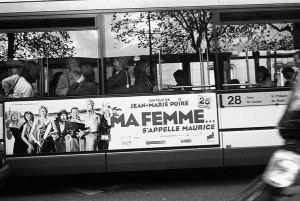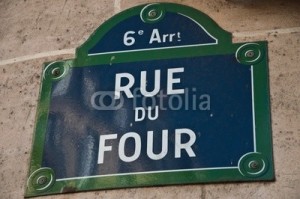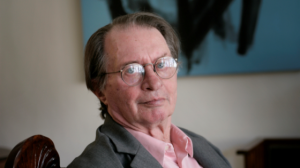Poetry in Translation (CLIII): Remco CAMPERT (b. 1929, The Hague, The Netherlands) – “To Poetry”, “ODĂ POEZIEI”
TO POETRY
Remco Campert (b.1929, The Hague)
Do you really mean to leave me, poetry
at three thirty in the afternoon
in the Rue du Four
while above me the sky closes down
in darkening tumult
and a street corner crashes into me
and I’ve lost count of all the people
well, you won’t get away with it
I hang on tight to the rail in bus 39
and decide in a giddy moment
I won’t put up with your dumping me
like a woman her aged lover
who no longer has any rights
later in the little park at Sèvres-Babylone
where a merry-go-round moans out its waltz
and under the trees there’s that black gent
with his grey stubble and cardboard suitcase
and that entire family that is homeless
and the American girl who is going to a concert in the evening
with that sweet fellow she just met
who read her Prévert’s poems
you’re here again
friends for good
don’t you ever forget it
dying is no excuse
In English by Donald Gardner
ODĂ POEZIEI
Remco CAMPER (n. 1929, Olanda,)
Tu, poezie, chiar vrei să mă laşi aşa in stradă,
la trei jumate după amiază
în Rue du Four
când cerul cade peste mine
într-un tumult de negură
iar colţul de stradă mă-nghionteşte
încât sunt pierdut în mulţimea asta
dacă-i aşa nu vei scăpa de mine
mă voi agăţa strâns de bara autobuzului 39
şi într-un moment de ameţeală voi decide
să nu mai înghit să mă alungi
aşa cum ar face o femeie iubitului ei bătrân
care s-ar afla dintr-odată fără nici un drept
mai târziu în părculeţul din Sèvres-Babylone
unde căluşeii circului se-nvârtesc într-un vals melancolic
şi unde, mereu, sub acelasi pom, se află un negru
cu barba căruntă şi cu geamantanul de carton presat
sau acea întreagă familie fără vre-un adăpost
şi încă tânăra Americancă ducându-se seara la concert
însoţită de bărbatul pe care de abea la întâlnit
şi care-i citeşte versuri de Prévert
aici vă regăsiţi
prieteni pe vecie
să nu uitaţi
moartea nu este o scuză.
(Rendered in Romanian by Constantin ROMAN, London
© 2012, Copyright Constantin ROMAN)
Note on Remco Campert:
Remco Wouter Campert was born in The Hague. A second generation poet of the same family, his father died in a Nazi concentration camp in 1943. Campert starred in theaters throughout the nation and beyond in a play he had created together with Jan Mulder (author and ex-football player). Their shows were based on both their literary works. 1995 was also the year he read his bestseller novel ‘Het leven is vurrukkulluk’ on the radio. Dutch people of younger generations will most likely associate his name with CaMu, the partnership between Remco Campert and Jan Mulder that wrote daily front-page columns for national newspaper ‘de Volkskrant’ from 1995 until 2006. These columns traditionally have been bundled into books titled CaMu ….: Het jaaroverzicht van Remco Campert en Jan Mulder at the end of each year. Remco is a prolific poet and novelist and a recipient of several honours.
Short note on the English translation:
Donald Gardner lives in Holland since 1978. He was originally a translator of Latin American literature and his published work includes an acclaimed translation of Octavio Paz’s long poem, The Sun Stone (Cosmos, York 1968), and Marcel Duchamp or the Castle of Purity (Cape, 1970). He also published translations of poems by Ernesto Cardenal and contributed to Con Cuba, an anthology of Cuban poetry (Cape Goliard, 1969). He translated the notoriously difficult novel Three Trapped Tigers by Guillermo Cabrera Infante, in collaboration with the author (Harper & Row, 1971).
He is the author of several collections of poetry, the most recent of which are: How to Get the Most out of Your Jet Lag (Ye Olde Font Shoppe, New Haven, 2001) and The Glittering Sea (Hearing Eye Press, 2006). He is known for his performances of his poetry – in Amsterdam, London and New York.





No Comments so far ↓
Like gas stations in rural Texas after 10 pm, comments are closed.